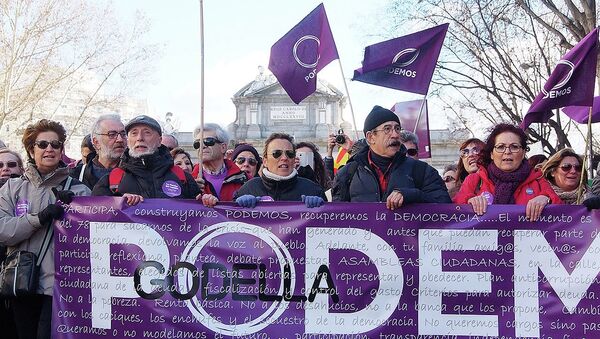"The nightmare is not over for Spain" according to leader of anti-austerity party Podemos, Pablo Iglesias.
At an alternative 'state of the nation' speech in Madrid, Iglesias said "austerity has not helped leave the crisis behind, it has not helped save the three main problems Spaniards have: unemployment, debt and inequality".
The leader said Prime Minister Mariano Rajoy Brey's government was useless:
"It is not only about how much people have been harmed. It is just inefficient, Mr. Rajoy, your government has proved to be useless and I say it with respect."
And as Iglesias addressed the crowd, they chanted, "Yes we can".
How will the Spanish #government's economic record fare against the anti-austerity #Podemos in upcoming elections? http://t.co/qWTDe9WoTH
— Expatica ES (@ExpaticaES) February 26, 2015
Podemos, which translates as 'we can' was founded in January 2014. It is now the second largest political party in Spain with a membership of around 350,000 people.
Rajoy Brey, leader of the People's Party has been the prime minister after winning the general election in 2011. Recent figures, according to the Spanish government, show a growth of 1.4 percent.
Brey recently pointed to a growth of 1.4 percent; but according to the leader of Podemos, the jobs are low skilled, low-paid and temporary.
Emerging in the aftermath of the inequality protests that erupted in Spain in 2011 and 2012, the left wing party's policies look to address inequality and unemployment. Podemos is calling for the austerity measures in Spain to be renegotiated.
Syriza and Podemos: Britain could "learn lessons" from Europe's radical insurgence http://t.co/Gq2IcqTaVW
— Sociological Review (@TheSocReview) February 26, 2015
In Britain, a lot of people will be looking towards Podemos and hoping it will represent a rejection of austerity, according to Tony Saunois, member of the Socialist Party and Secretary of the Committee for a Workers' International (CWI).
"It's a protest against the EU austerity measures", says Saunois.
"There's been a massive collapse in the authority of the old traditional parties that were associated with the austerity packages. The incredible representation of Podemos shows that people are looking for something new. People have to get organised to fight austerity."
Tony Saunois looks to Scotland where there has been a growth in the number of socialist parties and a surge in membership of the SNP, "it represents a change in people's outlook, says Saunois.
"Main stream parties on the left, and in Britain the Labour Party have all embraced austerity and people are looking for something new."
Following the news that Greek party Syriza has become the first anti-austerity party to get power in the Eurozone, leader of Podemos, Pablo Iglesias told the La Sexta news channel, "I think that the victory of Syriza will provoke something that's new in the political panorama of Greece — they're going to have a real Greek president, not a delegate of Angela Merkel whose interests will rank above those of the country and its people".
However, Saunois warns that if the leaders of Podemos in Spain and Syriza in Greece don't properly challenge austerity, "these parties could meet the same fate as the older traditional parties, which have seen their support collapse".
New CER insight: 'No, we can't: Why #Podemos is not #Syriza' by @CaminoMortera | Available: http://t.co/kQUxyBB76M pic.twitter.com/gHWibu60fr
— CER (@CER_London) February 20, 2015
Podemos and its popularity will be truly tested on March 22 when Spain's largest region, Andalucia votes in a regional election. Local and regional elections will take place in the rest of Spain in May, with the general elections scheduled for December 2015.




